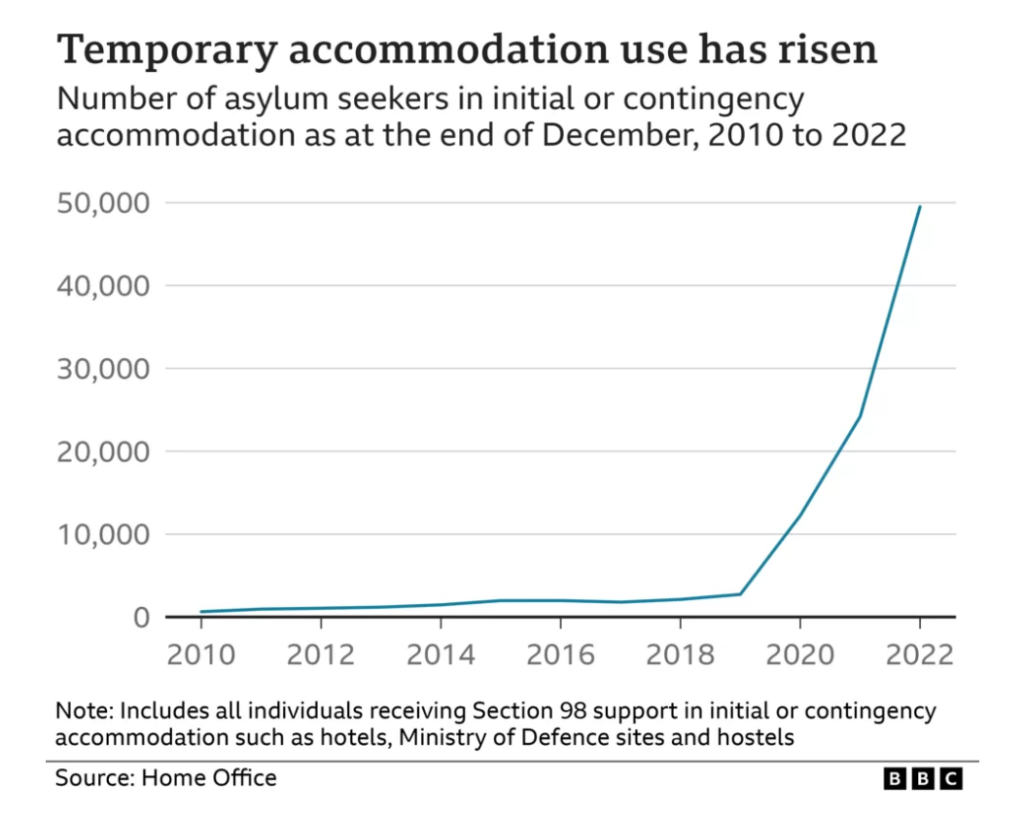
Private firms are making millions of pounds from the UK government’s accommodation programme for asylum seekers, causing inconvenience to businesses and residents, according to a BBC investigation.
The report revealed that the Home Office uses 395 hotels to house asylum seekers. 363 of these are in England, 20 in Northern Ireland, 10 in Scotland and two in Wales.
In 2022, the number of people claiming asylum in the UK reached a 20-year high of 74,751.
Allocation of asylum accommodation policy
Due to a lack of other suitable accommodation, asylum seekers are housed in hotels which are often taken over by the government at only a few days’ notice. Hotel owners are approached to hand over their properties to outsourced companies, which then run the business on behalf of the Home Office.
The BBC has found that existing bookings, including business conferences and weddings, have been cancelled at short notice. Serco and Mears Group are among the three companies which have contracts to run the hotels.
The BBC’s report showed that one booking agency, Calder Conferences, received £97m in payments from the Home Office in 2022. Its pre-tax profits trebled from £2.1m to £6.3m in the 12 months to February 2022.
How well do you really know your competitors?
Access the most comprehensive Company Profiles on the market, powered by GlobalData. Save hours of research. Gain competitive edge.

Thank you!
Your download email will arrive shortly
Not ready to buy yet? Download a free sample
We are confident about the unique quality of our Company Profiles. However, we want you to make the most beneficial decision for your business, so we offer a free sample that you can download by submitting the below form
By GlobalDataHotel accommodation for asylum seekers has caused anger among some communities and protests have occurred, some with the involvement of far-right elements. There have also been complaints of a lack of consultation before asylum seekers moved in.
Government’s search for alternatives
In March 2023, the UK government announced that surplus military sites at Scampton and Wethersfield will be used to accommodate asylum seekers who enter the UK illegally on small boats.
Immigration minister Robert Jenrick updated Parliament on the progress the government is making in delivering the Prime Minister’s priority to stop the boats, reducing the unsustainable pressure on the UK’s asylum system and the cost to the taxpayer caused by illegal crossings.
The government’s Illegal Migration Bill, which returned to Parliament in March 2023, is designed to stop crossings by ending illegal entry as a route to asylum in the UK.
The government says that this will significantly reduce the number of asylum seekers requiring accommodation in hotels, which is costing £6 million a day.

“Using expensive hotels for asylum seekers is wholly unacceptable”
Robert Jenrick, immigration minister
The UK’s minister for immigration, Robert Jenrick, provided an update on the efforts being made by the government to secure alternative, cost-effective accommodation options across the country that are more suitable for the purpose.
He stated: “The Home Secretary and I have been clear that using expensive hotels for asylum seekers is wholly unacceptable.
“Delivering accommodation on surplus military sites will provide cheaper and more orderly, suitable accommodation for those arriving in small boats.
“We understand the concerns of local communities and are working closely to listen to their views and reduce the impact of these sites, including through providing onsite security and financial support.”



